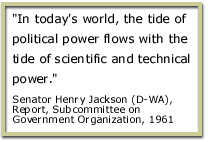
THE 1960'S
GROWTH AND CONFIDENCE
 In his January 20, 1961 inaugural address, John F. Kennedy declared that "the torch has been passed to a
new generation, born in this century, tempered by war and disciplined by a hard and bitter peace." He
launched a rapid U.S. missile build-up and established the Apollo program to best the Soviet Union in the
new frontier of space. The Cold War turned icy with showdowns over Berlin in 1961 and Soviet missiles in
Cuba in 1962. Scientific research was part of the Nation's Cold War arsenal, though Kennedy praised its
intellectual value as well. Federal support for research and development stood at $8 billion in 1960 and
would double in five years. Within that total, support of basic research at all federal agencies more
than tripled. By 1965, NSF's budget reached $416 million, with almost $276 million supporting research and
the rest funding education, including graduate education.
In his January 20, 1961 inaugural address, John F. Kennedy declared that "the torch has been passed to a
new generation, born in this century, tempered by war and disciplined by a hard and bitter peace." He
launched a rapid U.S. missile build-up and established the Apollo program to best the Soviet Union in the
new frontier of space. The Cold War turned icy with showdowns over Berlin in 1961 and Soviet missiles in
Cuba in 1962. Scientific research was part of the Nation's Cold War arsenal, though Kennedy praised its
intellectual value as well. Federal support for research and development stood at $8 billion in 1960 and
would double in five years. Within that total, support of basic research at all federal agencies more
than tripled. By 1965, NSF's budget reached $416 million, with almost $276 million supporting research and
the rest funding education, including graduate education.
 There followed enormous growth in large-scale scientific projects and advances across all disciplines,
thanks to generous support from an array of federal agencies. As the decade advanced, the Nation's
environmental awareness grew, as did hope that the social sciences would address poverty and crime.
During Lyndon B. Johnson's presidency, higher education gained federal support, though university-government
relations became strained over the Vietnam War.
There followed enormous growth in large-scale scientific projects and advances across all disciplines,
thanks to generous support from an array of federal agencies. As the decade advanced, the Nation's
environmental awareness grew, as did hope that the social sciences would address poverty and crime.
During Lyndon B. Johnson's presidency, higher education gained federal support, though university-government
relations became strained over the Vietnam War.
- Strengthening White House Science
- Golden Age of Growth
- More than an Advisory Board
- Expansion into Engineering and Applied Research
